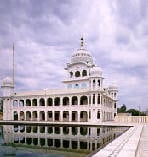Gurdwara Zafarnama: Difference between revisions
Hari singh (talk | contribs) No edit summary |
Hari singh (talk | contribs) No edit summary |
||
| Line 1: | Line 1: | ||
[[Image:Gd-zaf26.jpg|thumb|250px|right|Gurdwara Zafarnama]] | [[Image:Gd-zaf26.jpg|thumb|250px|right|Gurdwara Zafarnama]] | ||
The village Kangar in Bhatinda district was once the Capital of a big Hindu Zamindar Rai Jodh, disciple of Sixth Guru Hargobind. The holy dagger bestowed upon him by Guru Hargobind, is still in the possession of his descendents. This village is famous for the Gurdwara Zafarnama Sahib. | The village Kangar in Bhatinda district was once the Capital of a big Hindu Zamindar Rai Jodh, disciple of Sixth [[Guru Hargobind]]. The holy dagger bestowed upon him by Guru Hargobind, is still in the possession of his descendents. This village is famous for the Gurdwara Zafarnama Sahib. | ||
[[Guru Gobind Singh]] stayed here for a few days and wrote his famous defiant letter known as the [[Zafarnama]] (The Letter of Victory) in Persian to [[Mughal]] Emperor [[Aurangzeb]] at of the darkest times of his life. Most of the Sikhs had been scattered or killed including the Gurus four sons. In the letter Guru Gobind Singh starts by praising God and then goes on to condemn Aurangzeb for his failure as a ruler, for his communalism and for breaking his oath on the Koran to grant the Sikhs safe passage. Guru Gobind Singh wrote that when all peaceful means have failed, it is righteous to draw the sword to fight tyranny. The Guru describes the bloody battle of Chamkaur and invites Aurangzeb to visit him even though he has killed his four sons. The letter was personally delivered to the emperor in the Deccan by the Gurus two trusted Sikhs Bhai Daya Singh and Bhai Dharam Singh. Upon reading the letter the emperor was filled with remorse and asked Guru Gobind Singh to come visit him, but Aurangzeb died shortly thereafter in 1707. | |||
* see also [[Zafarnama]] | |||
[[Category:Gurdwara]] | [[Category:Gurdwara]] | ||
Revision as of 20:09, 24 December 2006
The village Kangar in Bhatinda district was once the Capital of a big Hindu Zamindar Rai Jodh, disciple of Sixth Guru Hargobind. The holy dagger bestowed upon him by Guru Hargobind, is still in the possession of his descendents. This village is famous for the Gurdwara Zafarnama Sahib.
Guru Gobind Singh stayed here for a few days and wrote his famous defiant letter known as the Zafarnama (The Letter of Victory) in Persian to Mughal Emperor Aurangzeb at of the darkest times of his life. Most of the Sikhs had been scattered or killed including the Gurus four sons. In the letter Guru Gobind Singh starts by praising God and then goes on to condemn Aurangzeb for his failure as a ruler, for his communalism and for breaking his oath on the Koran to grant the Sikhs safe passage. Guru Gobind Singh wrote that when all peaceful means have failed, it is righteous to draw the sword to fight tyranny. The Guru describes the bloody battle of Chamkaur and invites Aurangzeb to visit him even though he has killed his four sons. The letter was personally delivered to the emperor in the Deccan by the Gurus two trusted Sikhs Bhai Daya Singh and Bhai Dharam Singh. Upon reading the letter the emperor was filled with remorse and asked Guru Gobind Singh to come visit him, but Aurangzeb died shortly thereafter in 1707.
- see also Zafarnama

